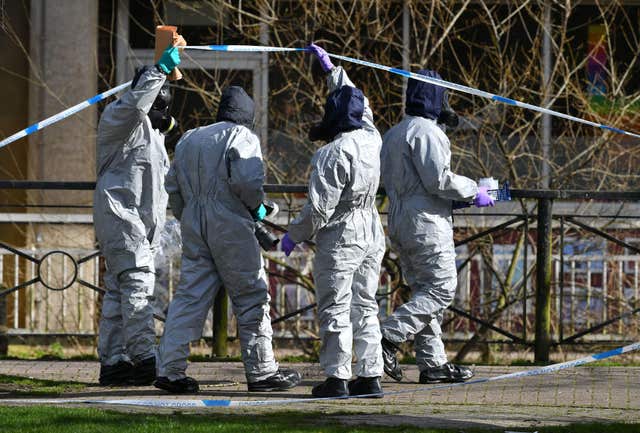
Member states of the global chemical weapons watchdog have agreed to update their list of banned substances for the first time by adding the nerve agent used in the Salisbury attack last year.
The decision to add Novichok nerve agents to the Chemical Weapons Convention was reached by consensus at the annual meeting of the 193 member states of the Organisation for the Prohibition of Chemical Weapons (OPCW).
Novichok joins agents including sarin, ricin and sulfur mustard on the convention’s so-called Schedule 1 of banned substances.
The change was proposed by the United States, Canada and the Netherlands.

In months of discussions leading up to this week’s meeting, Russia initially objected to the proposed changes but later relented after it also proposed adding chemicals to the banned list.
Moscow’s proposal also was adopted by consensus.
Officials at the Russian Embassy did not return a call seeking details of their proposal and the OPCW did not elaborate on it.
The convention, which outlaws the production and use of chemical weapons, came into force in 1997.
Novichok was developed by the Soviet Union during the Cold War.
It rose to infamy when it was used in the attack in March 2018 of former Russian spy Sergei Skripal.
Britain accused Russia of the March 2018 attack on Skripal and his daughter, Yulia, in the town of Salisbury.
Moscow denied involvement.
The Netherlands, Canada and the US have worked tirelessly to achieve today’s result: the @OPCW now bans deadly chemicals Novichoks. I fully support this strong response to the #Salisbury chemical attack! pic.twitter.com/px1M0ava18
— Stef Blok (@ministerBlok) November 27, 2019
Dutch foreign minister Stef Blok said in a tweet: “I fully support this strong response to the #Salisbury chemical attack!”
OPCW Director-General Fernando Arias welcomed the decision after the chairman of the annual meeting banged his gavel to indicate that the proposal had been approved without a vote.
“This is the first time in its history that the Chemical Weapons Convention’s Annex on Chemicals has been updated,” Mr Arias said.
“This is an important development that demonstrates the adaptability of the convention to changing threats while enhancing the OPCW’s ability to remain vigilant, agile, and fit for purpose.”
The changes come into force 180 days after Arias informs the UN secretary-general of the updated list.


Comments: Our rules
We want our comments to be a lively and valuable part of our community - a place where readers can debate and engage with the most important local issues. The ability to comment on our stories is a privilege, not a right, however, and that privilege may be withdrawn if it is abused or misused.
Please report any comments that break our rules.
Read the rules here